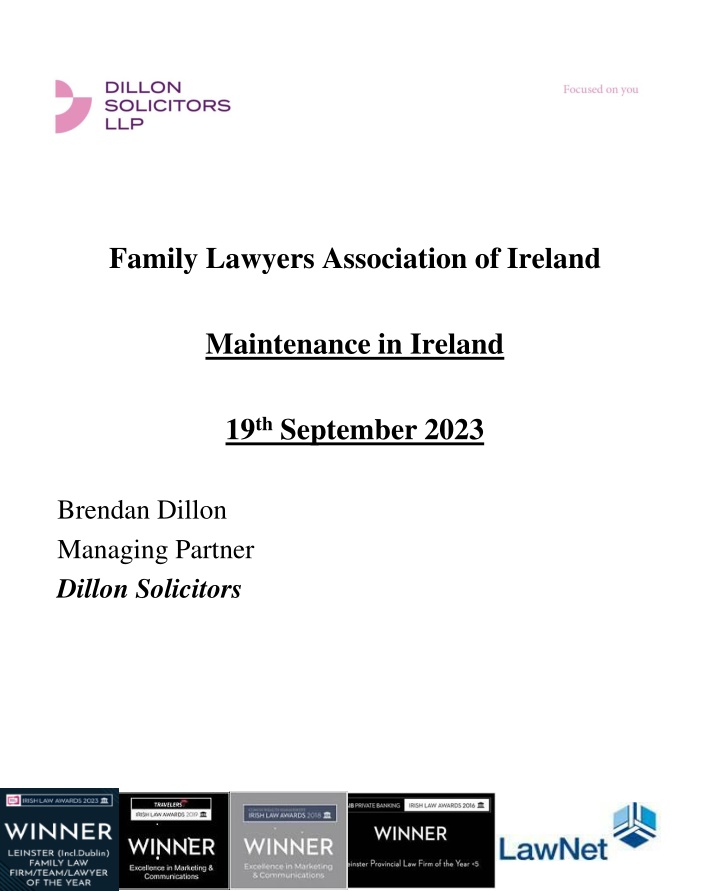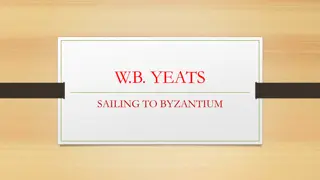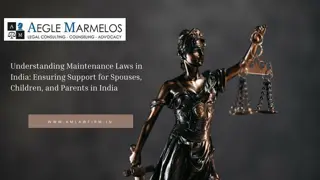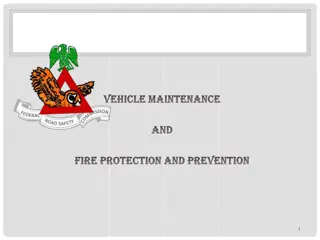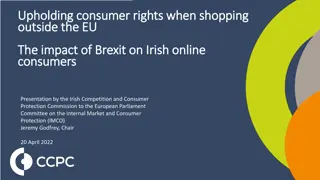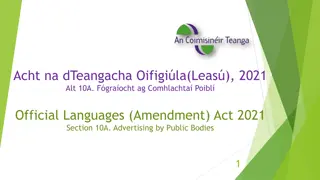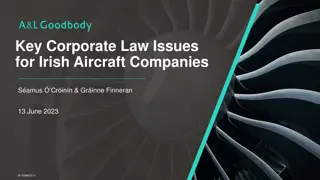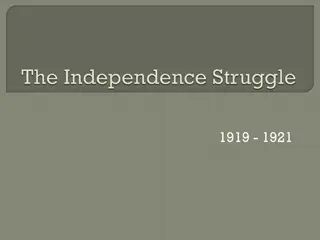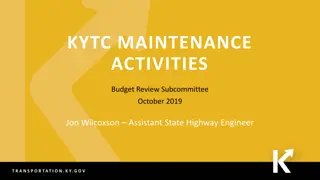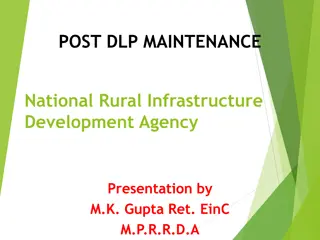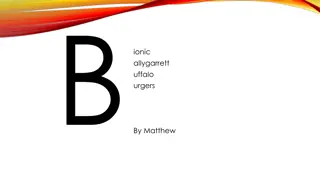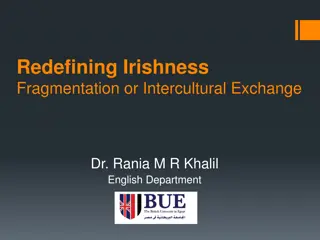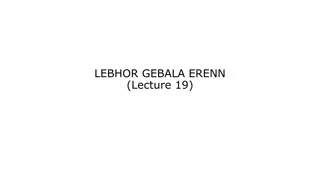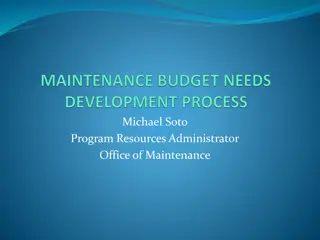Maintenance Provisions in Irish Family Law
Relevant legislative provisions, historical context, case law evolution, tax implications, and proposed reforms related to maintenance in Irish family law. Learn about the Guardianship of Infants Act, Family Law (Maintenance of Spouses and Children) Act, Status of Children Act, and Family Law Act of 1995, covering aspects such as periodic payments, variations, and security of maintenance orders.
Download Presentation

Please find below an Image/Link to download the presentation.
The content on the website is provided AS IS for your information and personal use only. It may not be sold, licensed, or shared on other websites without obtaining consent from the author.If you encounter any issues during the download, it is possible that the publisher has removed the file from their server.
You are allowed to download the files provided on this website for personal or commercial use, subject to the condition that they are used lawfully. All files are the property of their respective owners.
The content on the website is provided AS IS for your information and personal use only. It may not be sold, licensed, or shared on other websites without obtaining consent from the author.
E N D
Presentation Transcript
Family Lawyers Association of Ireland Maintenance in Ireland 19thSeptember 2023 Brendan Dillon Managing Partner Dillon Solicitors
Aim of Todays Talk 1. Review relevant legislative provisions historical context 2. Evolution of Case Law 3. RG v- NH 1986 4. NO v PQ CA Decision 5. Tax Implications on Payments 6. Social Welfare Entitlements 7. Proposed reforms
Relevant Legislative Provisions Guardianship of Infants Act, 1964 Section 11 (2) b - Periodic maintenance taking into account the means of the father or the mother such sum as the Court considers reasonable Section 12 - Order can be varied / discharged
Family Law (Maintenance Of Spouses And Children) Act, 1976 Section 5 (1) (a) such maintenance for the Applicant spouse and any dependent children of the family as is proper in the circumstances for such period during the lifetime of the Applicant Spouse, of such amount and at such times, as the Court may consider proper Section 6 Section 7 Section 9 Discharge / variation Interim Order provision of payments through District Court Clerk Section 10 Attachment of Earnings Order
Relevant Legislative Provisions Status of Children Act 1987 provided for maintenance of non marital children
Family Law Act, 1995 Section 7 Maintenance pending suit Order for such period beginning not earlier than the date of the application and ending not later than the date of its determination that the Court considers proper and specifies in the Order consistent with test in 1976 Act. Section 8 Periodical payments or lump sum can be for the spouse and / or dependent children on the granting of the Decree Section 18 Variation
Family Law Act, 1995 Contd. Section 41 provides for security of maintenance Orders. Section 42 - The Court may make a lump sum Order in addition to or in replacement of a Periodical Payment Order Sections 41 and 42 Refers to Jurisdiction of the District Court in addition to Circuit and High Court
Family Law (Divorce) Act, 1996 Section 12 - Maintenance Pending Suit Order Identical to Section 7 of 1995 Act. Section 13 Lump sum / Periodical Payments Order Identical to Section 8 of the 1995 Act Section 21 Retrospective Orders Section 22 Variation
Civil Partnership and Certain Rights and Obligations of Co- habitants Act, 2010 Sections 175 Allows for Periodic /lump sum/security for maintenance orders No provision for child maintenance orders
Evolution of Case Law RH v NH Supreme Court 1986 The Court recognised the inevitability that both parties and the children of the marriage would suffer a significant diminution of the overall standard of living. The Court set out the following test that subject to that overriding consideration the court must:- 1. Ascertain the minimum reasonable requirements of the wife and the children for whose upkeep the wife is responsible 2. Ascertain the income earned or capable of being earned by the wife (over and above the maintenance for which the husband is responsible)
Evolution of Case Law Contd. 3. Ascertain the true net take home pay and income of the husband. 4. Ascertain the reasonable living expenses of the husband taking into account the general consideration of economy affecting all the parties concerned but leaving the husband with a reasonable standard of living.
Evolution of Case Law Contd HD v PD Supreme Court May 1978 Court determined that a party could not contract out of maintenance and is still the position to this day. In order to succeed in an application for maintenance there must be a failure on the Respondent spouse to provide proper support C- v C 2017 CA Hogan J. stated where it is financially possible the wife is entitled to receive maintenance that will endeavour to match the standard of living which she enjoyed prior to a separation.
Evolution of Case Law Contd C- v C 2017 CA 30M (nett 24M) 240,000.00 per annum / 24,000.00 per annum 125,000.00 school fees 3.3M in lump sum Suitable and proper level of maintenance in line with Section 20 requirements
Evolution of Case Law Contd. Recent Case of NO v PQ Court of Appeal Decision 2021 This was a modest resources case. The parties were based in a rural location. The wife had not worked for many years. Two of the three children had a disability. High Court directed a periodic maintenance payments of 800.00 per month for a limited period of time of four years on the basis that this would enable the wife to go back to work. On appeal the Court of Appeal increased the spousal maintenance to 1600.000 per month and removed the limitation of time for spousal maintenance.
Evolution of Case Law Contd. Recent Case of NO v PQ Court of Appeal Decision 2021 Maintenance directed was so deficient as to quantum and as the duration as to the incapable of constituting proper provision on the particular facts of the case Whelan J.
Evolution of Case Law Contd. CA held that the High Court fell into error re: checklist at 16 (2) (a), (b), (g) and (h) of the 1995 Act a) Income, earning capacity, property and other financial resources b) Financial needs, obligations and responsibilities of each spouse in foreseeable future g) Relinquishment of employment opportunities h) Income, benefits wife is entitled under statute
Evolution of Case Law Contd. Recent Case of NO v PQ Court of Appeal Decision The following observation of the Court of Appeal are relevant:- - The Court has to differentiate between the cogent evidence of an established earning capacity on the part of the Claimant and mere contentions . In circumstances where the wife had not worked for many years the Court opined that in the case of a long marriage that one could not rely on an employment history which predated the marriage or prior to the children or which was of short duration.
Evolution of Case Law Contd. Recent Case of NO v PQ Court of Appeal Decision - The Court stated that it had to apply a stringent test in relation to the potential earning capacity of the wife. - The Court said that it had to be satisfied that the prospect of stable employment was real . - It had to assess the likely nature and extent of the income from that employment. - It had to establish the availability or likely availability of ongoing employment and that the employment had to be in a reasonable distance of the place of residence of the dependent spouse.
Evolution of Case Law Contd. Recent Case of NO v PQ Court of Appeal Decision - The Court said that there was a high bar before it should consider limiting maintenance for a particular term. - In order to limit it to a particular term the Court had to be satisfied with a high degree of confidence and certitude that the dependent spouse would be in a position to obtain adequate employment at a specific level of remuneration of a permanent and stable nature in order for the Court to cease maintenance at a particular point in time. - The Court much carry out a checklist evaluation.
Affidavit of Means Rules of Court Order 59 Rules 42 and 43 Circuit Court Rules Order 59 (a) Rule 17, 18 and 19 Circuit Court Rules Order 70 (a) Rule 6 Superior Court Rules Order 70 (b) Rule 5 Superior Court Rules High court Practice Direction 51.5 3 years financial disclosure Case progression Circuit Court Rules 1 year financial disclosure
Affidavit of Means In preparing an Affidavit of Means parties should complete schedule four on the basis of the previous twelve months expenditure and average it out over that period. This historical summary does not deal with situations where the parties financial position is likely to differ significantly following the separation / divorce. Consideration might be given to having a separate column of expenditure in the fourth schedule in Affidavits of Means prepared in advance of settlement / hearing which would project anticipated expenditure post settlement / hearing.
Summary - Cannot rely on employment history of historical nature i.e. predated marriage - prospect of stable employment must be real - Availability or likely availability of ongoing employment reasonable distance - High bar to limit for term high degree of confidence and certitude
Evolution of Case Law Contd. Recent Case of NO v PQ Court of Appeal Decision - The Court of Appeal emphasised the far-reaching consequences of ancillary relief orders. - Could an NO v PQ decision be distinguished ? It is possible that this decision could be distinguished on its facts in that the following factors were significant:- a. The wife had not worked for a long time b. The parties were based in a rural location with limited job opportunities for the wife c. There were children with disabilities
Evolution of Case Law Contd. Current Position Notwithstanding the very helpful points made by the Court in NO -v- PQ, there is still no concrete guidance as to how maintenance is to be awarded.
Evolution of Case Law Contd. Impact of NO v PQ on Interim Orders In light of the fact that the Court of Appeal s decision was clearly based on taking into account the various factors which are relevant for ancillary relief, this would not necessarily apply on an interim basis.
Considerations when Negotiating Maintenance - Make sure payments are secured preferably by life policy. Fallback security by way of contingent benefit - Current uncertainty re: Master trust policies this security lapses once the payor leaves that employment - Define the term of the payment retirement of payor or receipt by dependant spouse of any pension entitlements
Tax Implications on Payments The paying spouse gets an income tax (not USC) deduction on the gross spousal maintenance at their marginal rate which in most cases is 40%. No tax deduction for child maintenance which is tax neutral. There must be an enforceable agreement/Court Order Paying spouse must now put receiving spouses PPS number on their annual tax return. This prompts Revenue to check that the receiving spouse is making an equivalent of the gross maintenance as income.
PRSI on Maintenance The paying spouse can make a separate claim to recover the PRSI at 4% of the spousal maintenance This is to avoid the double hit to tax in relation to the PRSI payment. Even though the receiving spouse must pay the 4% they will be accumulating PRSI credits which can be of assistance in securing an entitlement for an old age pension.
Social Welfare Benefits Childrens allowance To applicant s child must be under 16 years of age. There is an exception to that rule if the child is 16 or 17 and they are in full time education. Childrens allowance is 140 a month with a once a payment every year. The once off payment is 100 a child to assist with the cost of living. To receive the allowance the applicant must be living in Ireland and satisfy the requirements laid out by the Habitual Residence Condition (HRC). You must apply for Child Benefit within 12 months of the birth of your child, the month your child became a member of the family, the month your family came to live in Ireland or the date you start working in Ireland. be eligible for allowance, the children s
Social Welfare Benefits Childrens allowance Contd Recent indications from Minister Humphries that this payment may extend to 23 if in full-time education
One Parent Family Payment One Parent Family payment is for parents under the age of 66 who have no spouse or partner and not cohabiting and whose youngest child is 7. One parent family payment will cease once the child turns 7. If you are recently divorced or separated, you must be living apart for 3 months before you apply for the Payment. The maximum amount you can receive is 220 a week.
Working Family Payment The working family payment is a tax-free payment available to employees with children. The payment is paid weekly, and its purpose is to provide families with extra financial support. The rate of the payment is dependent on the family s income and size. To be eligible for the payment, you must work at least 38 hours every fortnight, work in the Irish state and pay PRSI, that your job is likely to last 3 months, and have at least one child who lives with you and is under the age of 18.
Working Family Payment Contd However, if the child is between 18 and 22 and is in full time education you can be deemed as eligible. In relation to the requirement of child living with you to receive the payment, if the child is living abroad but is still dependent on you, you are entitled to the payment pursuant to the EU regulations. Working Family Payment is payable at 60% of the difference between your weekly family income. If you have one child, your weekly payment must be below 591 or if you have two children your weekly income must be below 692 and so on so forth.
Domiciliary CareAllowance A parent or guardian is eligible to apply for Domiciliary Care Allowance if their child is under the age of 16 and has a severe disability and requires substantial care on an ongoing basis. The assessment made by the scheme prior to granting applicants with the allowance is not based on the type of disability that the child has, it is based on the level of attention and care the child needs. The child s disability must be expected to exceed at least one year, otherwise the parent will not be qualified for the allowance. Additionally, the child must be living with the parent for at least five days a week and be ordinarily resident in the state. However, if your child is in your care for between 2-4 days you can still receive allowance except it is paid at 50% of the full rate. The Domiciliary Care Allowance is 330 a month. The last payment stops the month your child turns 16.
Widowed or Surviving Civil Partner Grant A Widowed or Surviving Civil Partner who have one or more dependent children may be entitled to a once off payment of 8000. The grant is for a surviving partner whose child is born within 10 months of the date of death of his or her civil partner. An application is made by post and sent to the Department of Social Protection.
Proposed Reforms Oireachtas Joint Committee on Justice recommendations July 2023 1. Statutory child maintenance agency be established responsible for assessing and enforcing issues pertaining to Court Orders and child maintenance 2. Link attachment of earnings to individuals PPS numbers 3. Simplify process for pursing child maintenance avoid court process
Proposed Reforms 4. Minimum essential standard of living be set for children set guidelines means test for the non primary care giver 5. Fixed financial penalties for no compliance with Court Orders 6. Non payment of maintenance should not impact on social welfare entitlements 7. Better enforcement of bench warrants for failure to turn up
Final Comments - Section 16 / 20 criteria remain relevant - Criteria in RH v NH - PO v NQ trying to limit spousal maintenance - Court still has very wide discretion - Beware of security for maintenance and lengthy of payment retirement / pension
Final Comments -in the context of final Orders Court must have regard to proper provision maintenance cannot be viewed in isolation RH v NH criteria need to look at other costs e.g. Mortgage
Ph: 01-2960666 Email: brendandillon@dillon.ie Dillon Solicitors A1 Nutgrove Office Park Rathfarnham Dublin 14 web: www.dillon.ie
